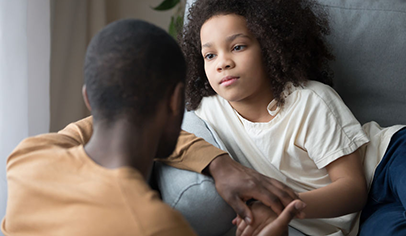Resources for Discussing Anti-Racism and Race Relations With Children

Helpful links for talking with your children about race, protests, violence, diversity, and activism in today’s world.
Starting conversations with kids about race relations can be hard, but it’s absolutely necessary. Kids need help from the adults in their lives to process events like the killing of George Floyd and others including Ahmaud Aubery and Breonna Taylor, and the protests and riots that have followed. But what do we say to them? How do we explain the violence? The pain? The anger?
No one has all of the answers, but we can point parents, teachers, and others who love and care for the youngest members of society and the world to some important resources from respected thought leaders who offer advice and help.
The resources below on race relations and anti-racism are suitable for varied ages. For some of the links, we’ve indicated the most appropriate age group.
Join the PTO Today community (it's free) for access to resources, giveaways and more
Books
-
embracerace.org lists 31 children’s books to support conversations on race, racism and resistance.
-
Bounceback parenting blog has a curated list of resources including books, activities, and media for talking to kids of all ages about race and racism.
-
The Brown Bookshelf promotes awareness of children’s books (picture, middle grade, and young adult) written and illustrated by people of color.
-
New York Family recently compiled a list called Resources and Books to Help Parents Educate Themselves on Racism.
-
A free e-book from Teaching Tolerance, Beyond the Golden Rule: A Parent’s Guide to Preventing and Responding to Prejudice has stories and conversation starters for ages 2-5, 6-12, and 13 and up.
- A New Jersey teacher started this viral list of children's books about race on the popular website ScaryMommy.com.
Articles or blog posts
-
Commonsense Media’s “Explaining the News to Our Kids” breaks down how to have difficult conversations with kids of different ages.
-
The American Academy of Pediatrics shares advice for families on how to talk to their children about racism.
-
embracerace.org has articles, topic pages, and webinars to help parents talk about race with young children (best for elementary).
-
The Anti-Defamation League has tips for a table talk about racism for kids 11 and older (best for middle or high school).
-
Healthychildren.org offers advice for parents talking to children about racial bias.
-
“Talking to Kids About George Floyd” from Child Mind Institute takes a commonsense approach to a difficult topic.
-
The American Psychological Association initiative on Defining Race and Ethnic Socialization has parent resources on having discussions about race with children of all ages.
Classroom or homeschool resources
-
Addressing Race and Trauma in the Classroom: A Resource for Educators from the National Child Traumatic Stress Network is a comprehensive guide on racial trauma and historical trauma, among other topics.
-
Education Week Teacher recently compiled a blog post called 15 Classroom Resources for Discussing Racism, Policing, and Protest.
-
The National Museum of African American History and Culture website Talking About Race has resources for educators, parents and caregivers, and anyone wanting to learn more about equity.
-
The National Education Association’s Black Lives Matter @ School—Resources and Racial Justice is Educational Justice include resources to help facilitate conversations about race, classroom-appropriate lesson plans, and guides on how to have tough conversations with peers and students.
-
The Center for Racial Justice in Education shares resources for talking about race, racism, and racialized violence with kids.
-
Teaching Tolerance has resources for teaching about race, racism, and police violence.
-
The National Association of School Psychologists has tips for teachers on countering coronavirus stigma and racism.
-
The American School Counselor Association has links to extensive anti-racism resources.






















